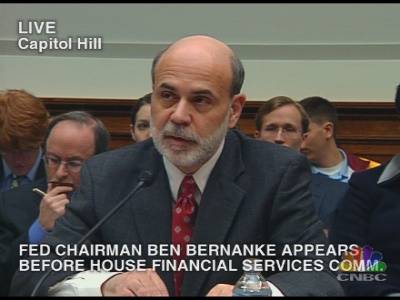WASHINGTON — The Obama administration ordered the nation’s 19 biggest banks on Wednesday to undergo stress tests to check whether they could hold up if the economy deteriorated further.

President Obama leaving Wednesday’s Oval Office meeting with his economic advisers and members of Congress.
Multimedia
But analysts say the administration’s worst projections, which it describes as unlikely, are not much more dire than what many private forecasters already expect.
According to the new Treasury Department guidelines, the banks would have to assume that the economy contracts by 3.3 percent this year and remains almost flat in 2010. They would also have to assume that housing prices fall another 22 percent this year and that unemployment would shoot to 8.9 percent this year and hit 10.3 percent in 2010.
“I don’t think they are harsh enough,” said David Hendler, an analyst at CreditSights, who said the dire projection was itself too optimistic about the growth that would be generated from President Obama’s stimulus program. “That would be a pleasant outcome, but you have to plan for the worst.”
The average outlook of private-sector forecasters envisions the economy shrinking by 2 percent this year and unemployment peaking just below 9 percent in 2010.
The average forecast for housing prices is a decline of 14 percent this year and an additional 4 percent next year.
Recent forecasts by the Federal Reserve and most private forecasters have undershot the severity of the downturn.
Big banks — those with more than $100 billion in assets — will have to carry out supervised analyses by the end of April of how much their capital would be depleted under the Treasury Department assumptions. If federal banking regulators conclude that a bank would not have enough capital under those circumstances, the bank would have to raise the extra money within six months or get it from the government in exchange for ceding a potentially big ownership stake.
The Treasury Department also laid out the terms on which it would offer banks additional capital, and the formula could make the government a major shareholder in banks like Citigroup with only a modest additional infusion of capital.
The Treasury said that it would provide new capital in exchange for shares of preferred stock that could be converted to shares of common stock at a price slightly below the level at which the shares traded on Feb. 9. For many of the big banks, that price would be slightly higher than the quoted prices today, but still at rock-bottom levels compared with just one year ago.
In effect, analysts said, the administration’s offer of additional capital could set a floor on share prices of the major banks, which will now be able to raise more money at lower cost if the market value of their shares dropped below the levels on Feb. 9.
Administration officials, insisting that they want to avoid full-fledged bank nationalizations, left themselves wide discretion on how to interpret the results of the stress tests.
In a telephone conference call with reporters, officials from the Fed and Office of the Comptroller of the Currency said there would be no simple measure for “passing” or “failing” a test, and provided only vague descriptions of how they would interpret the results.
“It sure sounds to me like they are designing this to make it sound like the banking system is in great shape,” said Paul J. Miller, an analyst at Friedman, Billings Ramsey, a brokerage firm that specializes in bank stocks.
Administration officials said their intention was simply to make sure that the nation’s big banks would remain adequately capitalized even if the economic recession is substantially worse than expected.
They said their goal was to increase confidence of investors and depositors in the big banks, providing tangible evidence that the institutions would have enough money, whether they had to raise it from private investors or get it from taxpayers.
Administration officials said there was no cap on how much money a single institution could obtain, and they declined to estimate how much money the government would end up injecting before the crisis was over. Banks and other “qualified financial institutions,” which now includes investment banks and insurance companies that are part of bank holding companies, can start applying for more money immediately.
The Treasury Department has already used or allocated the first $350 billion of the $700 billion financial rescue program that Congress approved last fall.
Many analysts say the administration will have to ask Congress to authorize additional spending, though administration officials have declined to make any predictions thus far.
Christopher Whalen, managing director at Institutional Risk Analytics, said Citigroup and other major banks would almost certainly become insolvent once they absorb the full brunt of losses from the economic downturn.
“The stress test is about politics,” Mr. Whalen said. “The O.C.C. and the Fed already know the answer. The answer is that we’re going to have to come to a decision: are we going to put in more equity or are we going to resolve the banks through bankruptcy?”
Even as Treasury officials laid the ground rules for getting banks through the current crisis, President Obama met with lawmakers in Congress to begin discussions about a broader overhaul of how the financial regulatory system oversees risk in the future.
Emerging from the meeting, Mr. Obama said the first principle of a new system should be that financial institutions “that pose serious risks to the markets should be subject to serious oversight by the government.”
He also said that the regulatory system should be strengthened to withstand major stresses and that the government should take steps to rebuild trust in markets by promoting transparency.













